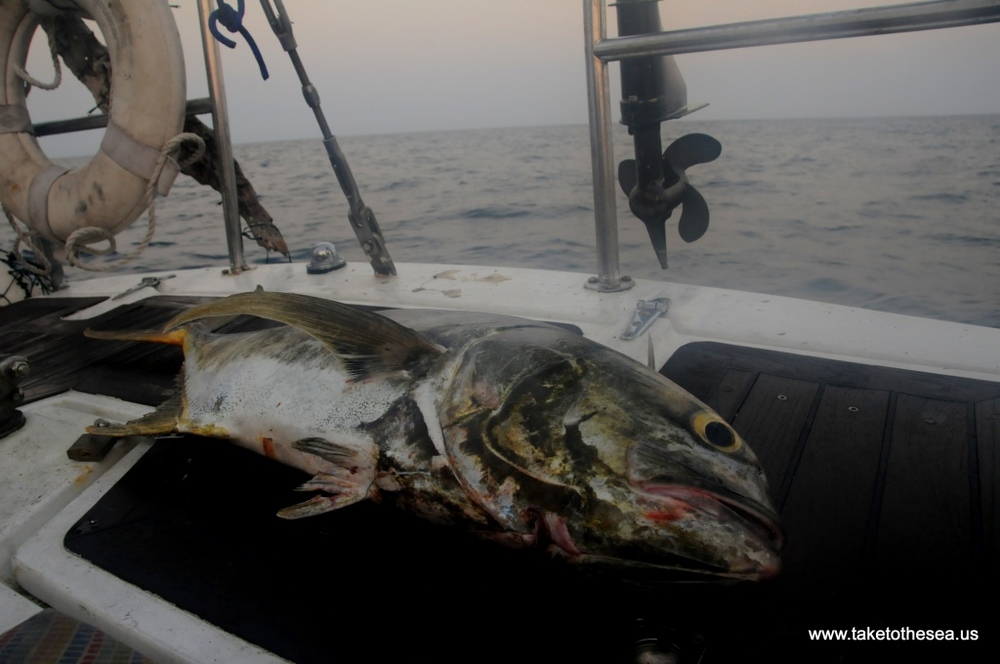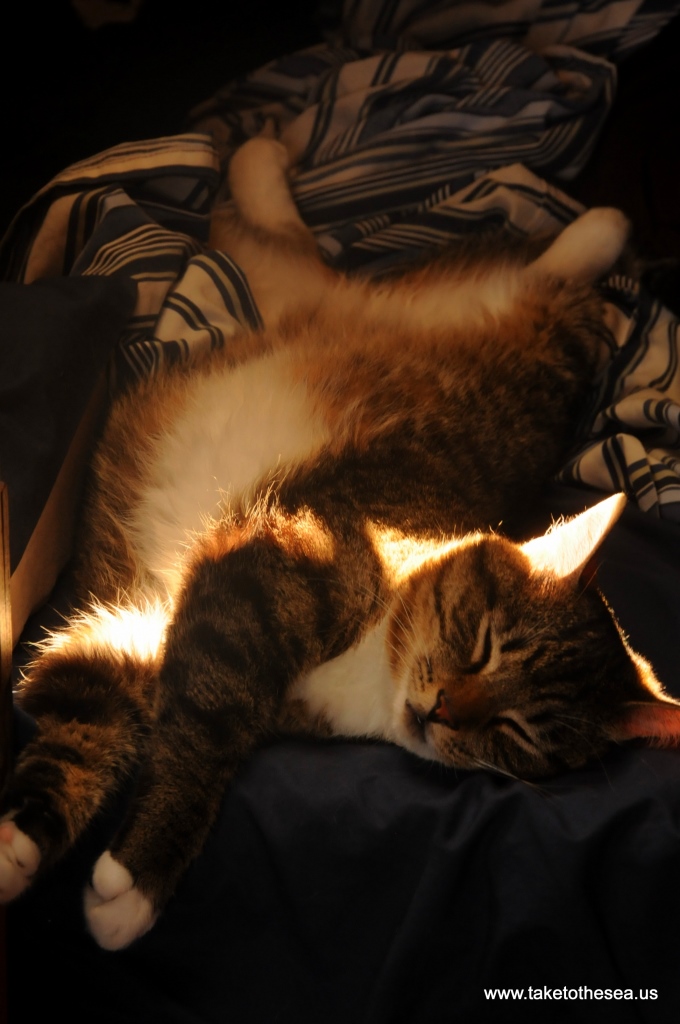 Pacific crevalle jack.
Pacific crevalle jack.
- Port of departure: Acapulco, Mexico
Departure date and time: 3:00pm on
Thursday, May 17 - Port of arrival: Bahias de Huatulco (Marina Chahue), Mexico
- Arrival date and time: 3:30pm on Sunday, May 19
- Miles traveled: 247 nm
- Travel time: 3 days and 30 minutes (72.5 hours)
- Engine hours: 1058.7 – 1088.0 – 29.7 hours
- Fuel consumption: 11.9 gal
- Fuel economy: 20.8 mpg
- Forecast: A very favorable forecast with winds at our side or back
(either W/SW or W/NW ) from 10-15 knots for most of the day, and then dying down every
evening. Small seas in the 1-2 meter range. Considering that most people get NO
wind on this stretch of coastline, we were grateful for what we got!
Another pleasant passage.
Nothing major happened, which was (and usually is) welcome. We read, we fished,
we slept, we played games, we cooked, we spent a lot of time complaining about
how hot it was, we bathed, we even got bored on a couple of occasions. We
lived, like normal people, with the only major exception being that our home
was in transit and her wings needed some careful attention every now and again
to ensure that she continued to fly forward.
In a previous post I
stated that “travel mode” made life more complicated and after this passage
(and the last) I feel the need to modify that statement. Maintaining travel can
be complicated because you need to make sure you’re stocked up on all of the
necessities and that you can fix things as they break, but the travel itself is life
simplified. It’s wonderful really, to have life boiled down to its simplest
elements – eat, sleep, work, play.
The wind was more
pronounced on this leg than on our last. It would pick up from the W/SW late in
the morning, slowly shifting to the W/NW in the afternoon and taper off once
the sun set. For the majority of the day we had a consistent 10-13 knots of
wind, meaning that our genoa saw most of the action.
Sailing was perfect and
pleasant during the day and we were immensely grateful for the breeze, which
wicked away the heat of the mid-day Mexican sun. At this point in our journey
we had steeped ourselves in information about hurricanes and were getting
sufficiently worried about getting past the Gulf of Tehuantepec as quickly as possible. In light of
these mounting worries, we maintained the rule that if we couldn’t keep the
sails full, we would (oftentimes grudgingly) turn the motor on. Roughly
translated, this means that when Serenity dipped below 2 knots, we motored. As
a result, we motored most of the nights and mornings.
During a light afternoon
breeze we took the spinnaker out of hiding and put her to work. After days on
end of light breezes, we were finally confident enough that we wouldn’t get
gusty whether out of nowhere (which was usually the case whenever we attempted
the spinnaker on Puget Sound). She did us proud on two separate occasions. On
one night she stayed full until the wind completely died at about 2am. We’re
still getting (re)acquainted with our spinnaker, though I expect she’ll
continue to serve us well in light winds.
On this passage, as well
as the last, we experimented with a new watch schedule that enabled both of us
to sleep a solid six hours, rather than 3 hours at a time. Jeff is much more of
a nocturnal creature, whereas I prefer watching the world wake up. Following a (magnificent)
sunset dinner (the sunsets were magnificent, dinner not so much) Jeff would
stand watch from 9pm to 3:30am, at which point I would wake up and keep watch
until around 10am. I was surprised on our previous passage at how much more
energy I had on this new schedule. Plus, I got to be awake for each sunrise, a
definite bonus.
The one downfall to the experimental
watch schedule is that if one of us doesn’t sleep well, we’re kind of hosed.
There was one night where I couldn’t turn my brain off and I struggled to relax
enough so that sleep could sink into my bones. Every time I teetered on the
edge of sleep, a sail would slap the stanchions or the boom would waver,
wrenching me out my tentative slumber. The wind was just on the verge of being
able to keep the sails full and my head refused to drain itself of so many busy
thoughts. Jeff will tell you that I emerged from the v-berth at 3:15am in a
foul mood, wanting to blame something other than my own head. He would be right
on this particular occasion. Fortunately all those thoughts kept me awake
through the 6 hour watch that followed. Despite that one night, the new watch
schedule holds promise, in mild weather, that is.
 Tack after a fresh fish luncheon.
Tack after a fresh fish luncheon.
I’m happy to report that
we caught another fish! I don’t remember which night it was (they all blur
together), but when I awoke I could see the light of my red headlamp reflecting
in its eyes and it scared the crap out of me (especially since I was still half
asleep). Once I realized that it was a fish, I was jubilant. We’d caught a
fish! Finally! After how many miles of trailing a hand line behind us? How did
it happen? I wanted to know. How did Jeff get it on board by himself in the
dark? Jeff could have fabricated a tale of great struggle and triumph, but he
told me the truth: “It was easy, actually, not a big deal. I just pulled in the
hand line and scooped him up with the net and, yeah…put him here in the
cockpit.” Neither one of us noticed that the hand line was pulled taut and
probably had been for half the day. By the time Jeff finally pulled it onboard,
the poor creature was so tired it didn’t have any fight left in it.
I waited until morning to
filet what turned out to be a Pacific crevalle jack (Caranx caninus). It was a
lot of fish, meaning we had enough for lunch and dinner for two days. I
wish I could tell you that it was a delicious fish…but it was not. Tack, on the
other hand, thought it was amazing, he couldn’t get enough of it. Regardless of
its pungent flavor, we were grateful for the gift.
We arrived at Marina
Chahue in the afternoon with just enough time to get our jerry jugs to the gas
station to fill up our diesel. We entertained leaving again the next morning,
but the allure of a full day of rest and cleaning was too powerful and we
succumbed to the comfort of two nights at the Marina (despite the fact that it
wasn’t cheap). One passage closer to El Salvador!
*Funny how we always
refer to fishes as him or he.
Lovely writing, thanks for sharing the little details.
Thanks for following along and thank you for the compliment :). Sometimes I feel like the Passage Notes just read like ramblings…which they more or less are.